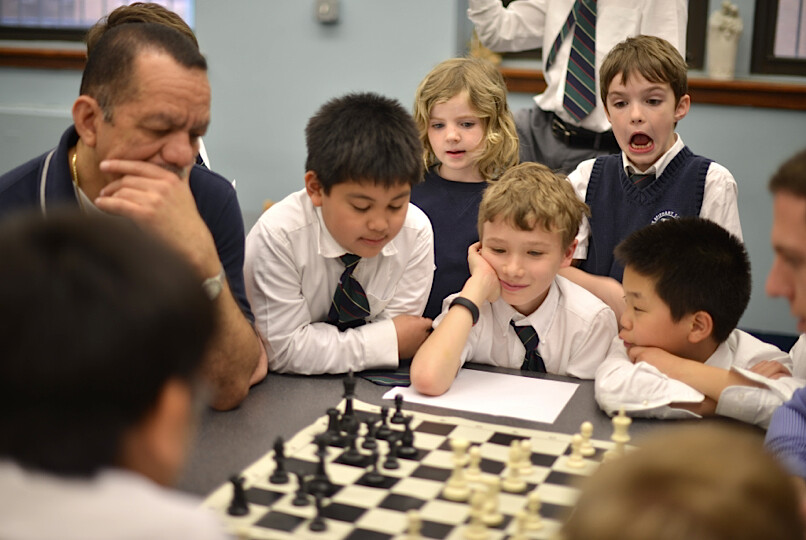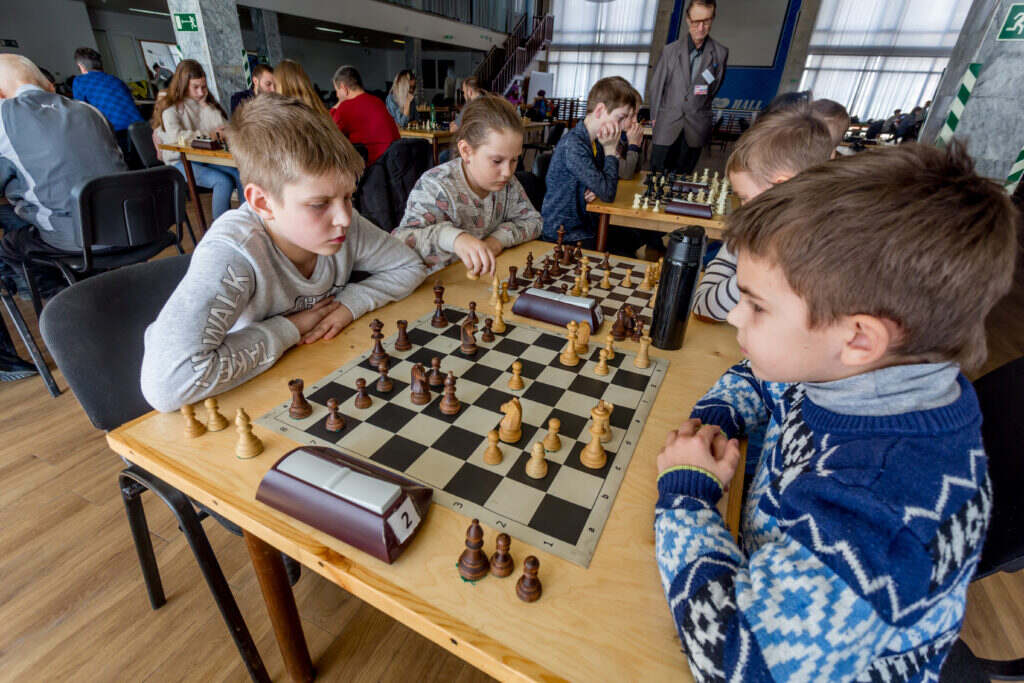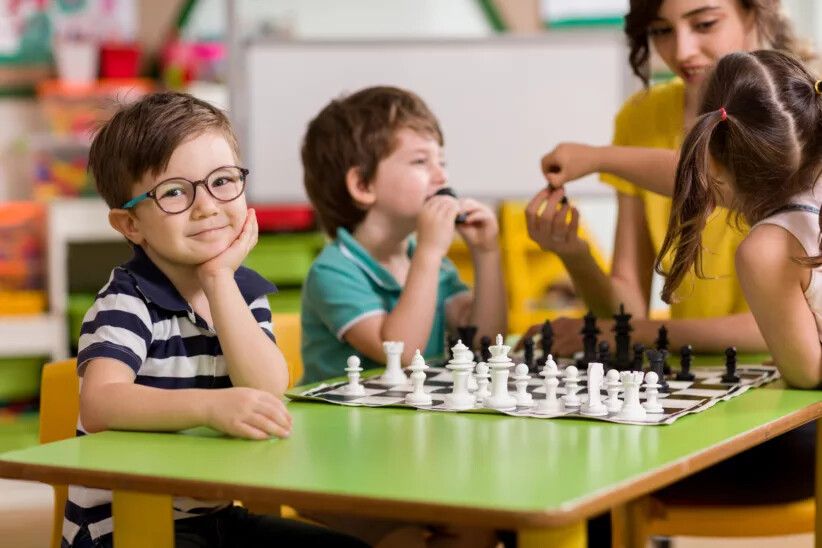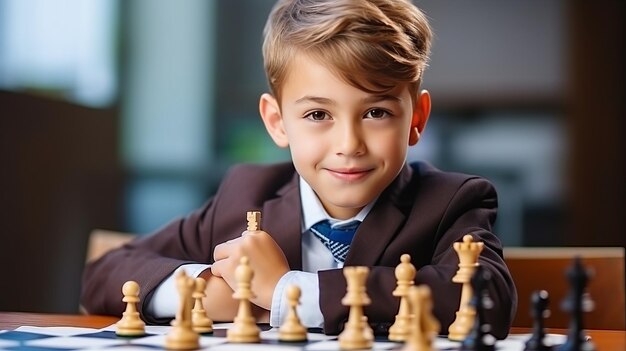Chess is often seen as a game of kings, a pastime for the intellectual elite. But in reality, it’s much more than that. For young minds, chess can be a powerful educational tool that builds cognitive skills, improves concentration, and fosters critical thinking. When children learn chess, they’re not just learning a game—they’re developing essential life skills that will serve them well in school and beyond.
In a world where distractions are everywhere, finding activities that engage young minds and challenge them to think deeply is more important than ever. Chess does exactly that. It draws children into a world where every decision matters and every move must be carefully thought out. Through the game, children learn to plan, solve problems, and think ahead—skills that are invaluable in both their academic and personal lives.
Cognitive Benefits: Sharpening the Mind
Chess is often referred to as a “brain game,” and for good reason. It actively engages the mind in ways that few other activities do. From the moment a child sits down at the chessboard, they are using their brain in new and complex ways.
The game demands focus, strategy, and quick thinking.
Enhancing Problem-Solving Skills
One of the most valuable lessons that chess teaches young players is how to solve problems. Each game presents a series of challenges, and players must find the best solutions.
Chess encourages children to think critically and creatively to navigate these problems. There’s no guessing or random chance involved in chess—every move must be calculated and purposeful.
This kind of problem-solving practice is transferable to many subjects in school, especially math and science, where students are often required to think logically and find solutions to difficult questions.
Chess helps children become better problem-solvers by making them comfortable with challenges and teaching them to approach problems step-by-step.
Developing Critical Thinking
Chess demands that players analyze each situation before making a decision. Young players learn to evaluate their options, think several steps ahead, and anticipate the consequences of their moves.
This process naturally builds critical thinking skills. Children who play chess regularly become more adept at analyzing information, considering multiple viewpoints, and making decisions based on evidence rather than impulse.
In school, this ability to think critically is invaluable. Whether it’s understanding a complex reading passage or solving a difficult math problem, critical thinking is a skill that helps students succeed in a variety of subjects.
Chess is a fun and engaging way to develop this skill outside the classroom.
Improving Memory
A good chess player must remember the rules of the game, the movement of each piece, and often, complex strategies that they’ve learned from past games. This reliance on memory helps young players sharpen their ability to recall information quickly and accurately.
Chess, therefore, acts as an excellent tool for improving both short-term and long-term memory.
Memory improvement from playing chess extends to academic subjects. Students who play chess regularly often find that they can recall facts, dates, and figures more easily, giving them an advantage in tests and exams.
Chess doesn’t just build memory in isolation; it helps young minds develop better recall and information retention across the board.
Boosting Focus and Attention
In our modern, fast-paced world, focus is a rare commodity. Many children struggle with maintaining attention, especially in school.
Chess, however, requires full concentration from start to finish. If a player loses focus for even a moment, they risk making a mistake that could cost them the game.
For young players, this intense level of focus helps them build the ability to concentrate for extended periods. Chess trains the brain to stay engaged, think deeply, and avoid distractions.
This is a skill that naturally carries over into their academic life, where long periods of concentration are often needed to complete assignments, take exams, and understand complex subjects.
Emotional Growth: Building Resilience and Patience
While chess is excellent for cognitive development, its emotional benefits are just as significant. For young minds, learning how to handle emotions such as frustration, disappointment, and success in a healthy way is crucial.
Chess provides a safe environment for children to face these emotions and learn to manage them effectively.
Teaching Resilience Through Loss
In chess, no one wins all the time—not even the best players in the world. Losing is an integral part of the game, and this can be a tough lesson for young children to learn.
However, it’s also one of the most valuable. Chess teaches children that losing isn’t failure—it’s an opportunity to learn and improve. Every lost game provides a chance to analyze what went wrong, figure out better strategies, and come back stronger next time.
This mindset is essential for success in life and school. Children who play chess learn not to fear failure but to see it as part of the process.
Whether it’s a difficult math test or a setback in a personal goal, the resilience they build through chess helps them push forward, even when things don’t go their way.
Developing Patience and Deliberation
Chess is not a fast-paced game. It requires patience and careful thought. Rushing through moves almost always leads to mistakes. Young players quickly learn that success in chess comes from taking their time, thinking through their options, and making deliberate decisions.
In today’s world, where instant gratification is often the norm, chess teaches the value of patience.
Children learn to delay immediate rewards in favor of long-term success. This skill of patience and careful deliberation is extremely helpful in school, where long-term projects, exams, and studying often require sustained effort over time.
Managing Emotions and Staying Calm Under Pressure
Chess is often played under time constraints, especially in competitive settings, which adds another layer of difficulty. Players must make decisions quickly while still thinking clearly.
This pressure can cause stress, especially in younger players, but it also teaches them how to stay calm and focused even when they’re feeling anxious or overwhelmed.
Learning how to manage stress and remain calm in high-pressure situations is an invaluable life skill. Whether it’s taking an important exam, performing in front of an audience, or dealing with a personal challenge, the ability to stay composed under pressure can make all the difference.
Chess provides regular practice in this area, helping young minds become more emotionally resilient and better equipped to handle stressful situations both in and out of school.
Social Skills: Fostering Communication and Empathy

While chess is typically a one-on-one game, it is deeply social in nature.
Players engage in friendly competition, discuss strategies, and often mentor one another. These interactions help young players develop essential social skills like communication, empathy, and respect for others.
Encouraging Respect and Sportsmanship
Chess teaches children the importance of respecting their opponents. Whether they win or lose, players are expected to shake hands and acknowledge each other’s efforts.
This helps instill a sense of sportsmanship, teaching children how to win graciously and lose with dignity.
These lessons in respect and sportsmanship are crucial for social development. In school and life, children will face situations where they need to work with others, handle disagreements, and deal with both success and failure in a respectful manner.
Chess provides a framework for learning how to navigate these situations with grace.
Enhancing Communication Skills
Chess is a game that encourages discussion, whether it’s analyzing a recent match, explaining a particular strategy, or teaching someone else how to play.
These conversations help young players develop the ability to articulate their thoughts clearly and listen to others’ perspectives. It’s not just about making the right move on the board—it’s also about explaining why that move was made and considering alternative options.
Strong communication skills are vital for success in school and beyond. Whether participating in class discussions, working on group projects, or giving presentations, children who play chess often find it easier to express their ideas and collaborate with others.
Chess encourages open dialogue, helping children become more confident in sharing their thoughts.
Promoting Empathy Through Perspective-Taking
One of the key strategies in chess is predicting your opponent’s next move. To do this effectively, players must put themselves in their opponent’s shoes and think about the game from their perspective.
This practice of perspective-taking fosters empathy, as players learn to consider how others think and feel.
In life, empathy is an important social skill. It helps children understand others, build stronger relationships, and navigate social situations more effectively. Chess offers a unique opportunity to develop this skill in a fun and engaging way.
Academic Benefits: Boosting Performance in School
The skills that children develop while playing chess have a direct impact on their academic performance. Chess not only strengthens cognitive functions like memory, concentration, and problem-solving but also helps students improve in specific academic subjects.
Whether it’s math, reading, or science, chess provides young learners with a mental framework that enhances their ability to understand and excel in their studies.
Enhancing Mathematical Abilities
Chess and math share many similarities. Both require logical thinking, pattern recognition, and the ability to plan several steps ahead. As children learn to think strategically in chess, they develop the same skills they need to succeed in math.
For example, when a player calculates the outcome of multiple moves in advance, they’re engaging in the same type of thinking required to solve complex equations or understand mathematical patterns.
Children who play chess regularly often find that their math skills improve as they become more comfortable with logical reasoning and abstract thinking. Chess helps to demystify math by showing students that numbers and equations are part of a broader system of patterns and rules, just like the movements on a chessboard.
Strengthening Reading and Comprehension Skills
While chess may seem purely mathematical, it also helps develop language and reading comprehension skills. Chess players must understand complex rules and follow instructions carefully, both of which are critical skills for reading and comprehension.
Additionally, chess teaches children to focus on details and analyze information, which can be applied when reading a story or understanding a passage.
In fact, chess improves the ability to think critically, which is essential for understanding literature and other subjects that require reading comprehension.
When a child looks at a chessboard, they’re analyzing the situation, predicting what might happen next, and understanding the bigger picture—just like when they read a book and think about the plot, characters, and themes.

Encouraging Logical Thinking in Science
Science is all about inquiry, experimentation, and understanding how different parts of the world work together. Chess nurtures the same kind of curiosity and logical thinking that is necessary for success in scientific subjects.
When a child plays chess, they’re constantly asking themselves questions like, “If I make this move, what will happen?” or “How can I improve my position on the board?” These questions mirror the scientific process, where hypotheses are tested and conclusions are drawn based on evidence.
Additionally, chess encourages students to approach problems systematically. Just like in science experiments, chess players must carefully observe, plan, and adjust their strategies as the game progresses.
This ability to adapt and learn from mistakes is crucial in both chess and scientific discovery, where trial and error are essential components of learning.
Boosting Focus During Exams
Chess teaches young players how to focus for long periods of time, a skill that directly benefits their performance during exams and other academic assessments. In chess, players must concentrate deeply on the game without getting distracted, sometimes for an hour or more.
This intense focus helps children build the mental stamina needed for exams, where long periods of attention and problem-solving are required.
In a classroom setting, children who play chess often demonstrate better concentration and attention to detail, which can lead to improved performance on tests and assignments. They are better able to manage their time, stay focused on difficult problems, and approach each task with a clear plan—skills that are critical for academic success.
Developing Strategic Planning for Projects
One of the core elements of chess is the ability to plan ahead. Players must think several moves into the future, considering both their own strategy and how their opponent might react.
This skill of forward planning is invaluable in school, particularly when students are working on long-term projects or preparing for exams.
Chess teaches children to break down complex tasks into smaller, more manageable steps, just as they would in a school project.
Whether it’s writing an essay, preparing a science presentation, or studying for a big exam, children who play chess are better equipped to plan their time effectively and execute their work in an organized, strategic manner.
Chess and Personal Development: Building Character and Independence

Beyond the cognitive and academic benefits, chess is a valuable tool for personal development. It fosters traits such as responsibility, independence, and confidence—qualities that are essential for success in life.
By playing chess, young minds learn not only how to think and solve problems but also how to develop a strong sense of self and character.
Promoting Independence and Accountability
In chess, every decision is your own. There’s no luck involved, no team to rely on—it’s just you, your mind, and the chessboard.
Each move you make has consequences, and whether it leads to victory or defeat, the result is a direct outcome of your choices. This teaches children the importance of being accountable for their actions.
This sense of responsibility is crucial for personal growth. When children understand that their decisions matter, they become more independent and confident in their ability to make choices in both chess and life.
This independence translates well into academic settings, where students are expected to manage their time, complete assignments on their own, and take responsibility for their own learning.
Building Confidence and Self-Esteem
Success in chess doesn’t come easily. It requires practice, patience, and perseverance. But as children improve and see their hard work pay off, they build a sense of confidence and accomplishment.
Every game won is a reminder that they have the ability to overcome challenges and succeed through effort.
This growing confidence isn’t limited to the chessboard. Children who experience success in chess often carry that self-assurance into other areas of their lives, whether it’s in the classroom, on the sports field, or in social situations.
Chess shows young players that they are capable of achieving their goals through determination and hard work, which is an invaluable lesson for life.
Teaching Discipline and Work Ethic
Chess is a game of discipline. To become a skilled player, children must practice regularly, study strategies, and learn from their mistakes.
There are no shortcuts to becoming a better chess player; it requires dedication and a strong work ethic.
This discipline, cultivated through chess, is easily transferable to school and other areas of life. Children who develop a strong work ethic in chess are more likely to approach their studies with the same level of commitment.
Whether it’s studying for a test, practicing a musical instrument, or mastering a new hobby, the discipline and focus that chess requires teaches children the value of hard work and persistence.
Encouraging Goal Setting

In chess, players often set both short-term and long-term goals.
A short-term goal might be to capture an opponent’s piece in the next few moves, while a long-term goal could be winning the game or mastering a new opening strategy. By regularly setting and working toward these goals, young players learn how to establish clear objectives and pursue them with purpose.
This habit of goal setting is crucial for personal and academic success. When children set goals, they become more motivated and focused in their efforts.
Whether it’s improving their grades, learning a new skill, or completing a big project, the ability to set clear goals—and work steadily toward them—is a life skill that will benefit them for years to come.
Enhancing Decision-Making Skills
Decision-making is at the heart of chess. Players must evaluate the board, consider multiple options, and choose the best move based on what they know.
This constant practice of making decisions strengthens a child’s ability to assess situations, weigh options, and make informed choices.
In everyday life, decision-making is a critical skill. Children are often faced with choices, whether it’s deciding how to spend their time, which subjects to focus on, or how to resolve a disagreement with a friend.
Chess gives young minds the practice they need to become confident, thoughtful decision-makers, which is an essential part of personal development and maturity.
Learning from Mistakes
Mistakes are inevitable in chess, as they are in life. What sets chess apart is that it teaches children how to learn from these mistakes in a constructive way.
After a game, players often go over the moves, reflecting on what they could have done better and analyzing where they went wrong. This reflective process encourages a growth mindset, where mistakes are seen not as failures, but as opportunities to learn and improve.
This ability to embrace mistakes and learn from them is an important part of growing up. In school, students will face challenges, get answers wrong, and occasionally fall short of their goals. But with the mindset chess teaches, they can see these setbacks as temporary, and part of the path toward improvement.
The more they practice this in chess, the more naturally it comes to them in their studies and personal lives.
Final Thoughts: Chess as a Holistic Educational Tool
Chess offers much more than just entertainment—it’s an all-encompassing educational asset that shapes young minds in profound ways. Through this ancient game, children develop critical thinking, emotional resilience, and essential life skills that extend far beyond the chessboard.
Cognitive Growth Beyond the Game
Chess trains the brain to think critically, solve problems, and develop strong memory skills. The mental exercises that chess provides sharpen young minds for academic success in subjects like math, reading, and science.

It’s an effective tool for boosting cognitive development in ways that few other activities can match.
Emotional Strength and Patience
Learning to lose gracefully, staying calm under pressure, and cultivating patience are core lessons that chess teaches. These emotional skills are invaluable for handling life’s challenges, both in school and in personal situations.
Chess helps children build emotional resilience, a quality essential for success in the real world.
Social Skills and Respect
Though often viewed as a solitary game, chess builds strong social skills through respectful competition, communication, and empathy. By understanding their opponent’s perspective and interacting with others, young players develop interpersonal skills that are important for positive social interaction and teamwork.
Personal Responsibility and Discipline
Chess empowers children to take responsibility for their decisions and actions. It teaches independence, accountability, and the value of hard work.
These qualities translate directly into academic and personal success, fostering a sense of self-discipline that is essential for lifelong achievement.
A Tool for Lifelong Learning
The lessons chess teaches don’t stop when the game ends. Its impact on fostering curiosity, strategic thinking, and a love for learning lasts a lifetime.
Chess encourages children to see challenges as opportunities for growth and to continuously seek improvement.
Wrapping It Up
Chess is more than just a game—it’s a powerful tool that shapes young minds in lasting and meaningful ways. From boosting cognitive abilities and fostering emotional resilience to enhancing social skills and personal responsibility, chess equips children with the tools they need to succeed both in school and in life. Its lessons transcend the board, encouraging critical thinking, patience, and a lifelong love for learning.
At Global School of Chess, we are dedicated to helping young learners unlock their full potential through the incredible game of chess. Whether your child is a beginner or already familiar with the game, chess will serve as a valuable foundation for growth, both intellectually and emotionally.
If you’re ready to invest in your child’s future and watch them thrive, start their journey with us at Global School of Chess. Together, we’ll help them make every move count—both on the chessboard and in life.
READ NEXT:

